How to replace a chain-drive garage door opener gear and sprocket assembly
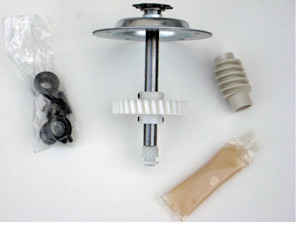
This DIY repair guide explains how to replace the gear and sprocket assembly on a chain-drive garage door opener. Located at the top of the motor unit, the gear and sprocket assembly drives the chain that opens and closes the garage door. If the gear and sprocket assembly breaks, the motor runs, but the door won't move. Replace a broken gear and sprocket assembly with the manufacturer-approved garage door opener part.
Follow the steps in this repair guide and video to replace the gear and sprocket assembly in Craftsman, Chamberlain and LiftMaster chain-drive garage door openers.
This video explains how to replace the gear and sprocket assembly on a garage door opener.
Instructions
- 01.
Disconnect power
Use a step ladder to access the garage door opener’s power cord and motor unit.
Unplug the garage door opener.
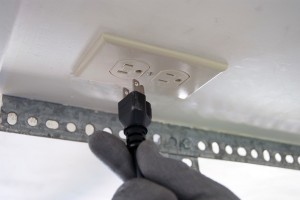
PHOTO: Unplug the garage door opener.
- 02.
Lower the motor unit down
Position a work table near the area under your motor unit to hold the garage door opener during the repair.
Pull the emergency release rope to release the trolley from the garage door.
Shut the garage door if it's not already closed.
Remove the fastener ring from the straight door arm connected to the outer trolley.
Pull out the clevis pin while supporting the straight arm to disconnect the garage door from the outer trolley.
Lower the straight and curved arms and rest them against the garage door.
Open the light cover to access the wall control and safety sensor wires connected to the motor unit.
Take a digital photo of the wall control and safety sensor wires connected to the motor unit. You’ll refer to the photo later when reconnecting the wires.
Disconnect the wall control and safety sensor wires from the motor unit.
Close the light cover.
Remove the nuts, bolts, and lock washers that secure the motor unit to the ceiling bracket. Support the motor unit with one hand as you remove the last bolt from the ceiling bracket.
Carefully lower the motor unit down and rest it securely on top of the step ladder. Use a helper if necessary.
Climb down the step ladder, lower the motor unit down and rest it on your work table.
Move your step ladder by the garage door so you can remove the rail from the header bracket.
Remove the fastener ring from the header bracket clevis pin.
Pull the clevis pin out of the rail and header bracket while supporting the rail with one hand.
Lower the rail and rest it on a rung of the step ladder so the rail is level with the motor unit on your work table.
Tip: To avoid scratching a decorative garage door, remove the nuts, bolts and washers from the curved arm and carefully rest the curved arm against the door when disconnecting the garage door from the outer trolley.Tip: You may want to have a helper assist you when lowering the motor unit down.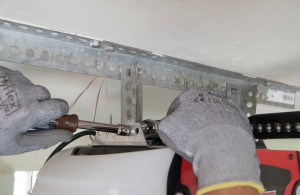
PHOTO: Remove the motor unit bolt.
- 03.
Remove the chain and cable assembly
Using a felt-tip marker, mark a link of chain for when you reinstall the chain after replacing the gear and sprocket assembly.
Slide the outer trolley away from the inner trolley.
Remove the outer nut and lock washer from the trolley threaded shaft and pull the threaded shaft out of the trolley.
Pull the chain off the motor unit sprocket and out of the chain spreader.
Lay the chain on the garage floor while you complete the repair.
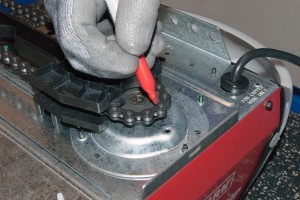
PHOTO: Mark the chain.
- 04.
Remove the gear and sprocket assembly
Remove the light covers and light bulbs from the motor unit.
Remove the screws from the chain spreader and pull the chain spreader off the motor unit.
Flip the motor unit over.
Remove the screws from the motor unit cover and pull the motor unit cover off.
Remove the plastic helical gear retainer and pull the helical gear off.
Remove the gear and sprocket assembly mounting screws.
Pull the gear and sprocket assembly out.
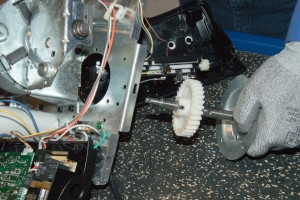
PHOTO: Remove the gear and sprocket assembly.
- 05.
Install the new gear and sprocket assembly
Because the mounting holes in the new gear and sprocket assembly aren't threaded, thread the mounting screws into the new gear and sprocket assembly to make it easier to install the new assembly. Then remove the screws.
Apply grease to the plastic drive gear.
Insert the gear and sprocket assembly into the motor unit and install the mounting screws.
Apply grease to the helical gear.
Push the helical gear onto the gear and sprocket assembly shaft and secure it with the retaining clip.
Reinstall the motor unit cover and secure it with the mounting screws.
Flip the motor unit over.
Reinstall the light bulbs and light bulb covers.
Reinstall the chain spreader, securing it with the mounting screws.

PHOTO: Install the new gear and sprocket assembly
- 06.
Reinstall the chain
Making sure not to twist the chain, thread it through the chain spreader and around the motor unit sprocket, matching the marked chain link to the motor sprocket.
Thread the inner nut up to the top of the trolley threaded shaft and reinstall the inner lock washer on the threaded shaft.
Insert the trolley threaded shaft into the trolley hole and reinstall the outer nut and lock washer.
Hand-tighten the outer nut.
Tip: Have a helper push the inner trolley toward the threaded trolley shaft to apply more tension to the chain and cable, making it easier to thread the outer nut onto the trolley shaft.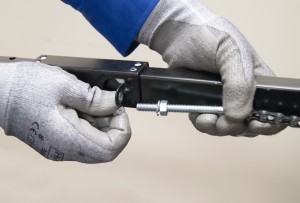
PHOTO: Reconnect the trolley threaded shaft to the trolley.
- 07.
Tighten the chain
Adjust the outer nut to position the trolley threaded shaft so the chain hangs about 1/4-inch above the base of the rail at its midpoint.
Tighten the inner nut against the trolley to secure the trolley threaded shaft.
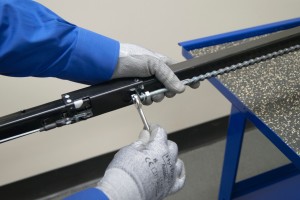
PHOTO: Tighten the chain.
- 08.
Reinstall the garage door opener
Reconnect the rail end to the header bracket using the clevis pin and fastener ring.
Position your step ladder under the motor unit ceiling bracket and carefully set the motor unit on top of the step ladder.
Climb the step ladder and reinstall the motor unit to the ceiling bracket using the nuts, bolts and lock washers.
Open the light cover to access the wall control and safety sensor terminals on the motor unit.
Using your digital photo for reference, reconnect the wall control and safety sensor wires to the motor unit.
Close the light cover.
Reconnect the straight door arm to the outer trolley using the clevis pin and fastener ring.
Re-engage the trolley.
Tip: Reconnect the curved door arm to the straight door arm using the bolts, lock washers and nut if you disconnected the curved arm from the straight arm when freeing the garage door from the outer trolley.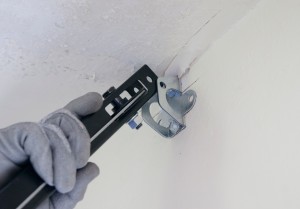
PHOTO: Reconnect the rail to the header bracket.
- 09.
Reconnect electrical power
Plug in the garage door opener.
- 10.
Adjust the travel limits
Run the garage door opener through a complete travel cycle to check upper and lower travel limits.
If the garage door doesn't close completely, adjust the down travel and cycle the door open and closed to test the adjustment. Continue to adjust the down travel until the door closes completely.
If the door doesn't open completely, adjust the up travel in the same manner.
Tip: Repeated operation of the garage door opener during travel limit adjustment may cause the motor to overheat and shut off. Wait 15 minutes to allow the motor to cool and then continue adjustments.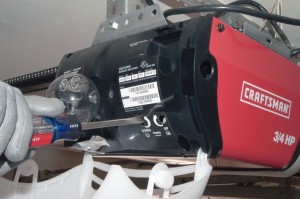
PHOTO: Adjust the travel limits.
Most common symptoms to help you fix your garage door openers
Choose a symptom to see related garage door opener repairs.
Main causes: garage door opener misaligned, travel limits need adjustment, bad travel limit switches, faulty logic contr…
Main causes: garage door locked, damaged garage door tracks, up-force setting needs adjustment, RPM sensor failure, bad …
Main causes: safety sensor beams blocked, safety sensors not aligned, downforce setting needs adjustment, damaged garage…
Things to do: check garage door travel, tighten brackets and fasteners, test safety sensors, check travel limits and for…
Main causes: radio interference, weak remote batteries, sunlight interference with safety sensor beams, safety sensors n…
Main causes: faulty logic control board, bad RPM sensor, broken gears in the drive system, bad drive motor…
Main causes: neighbor's remote programmed at the same time as yours, faulty wall control wiring, bad wall control unit…
Main causes: loose fasteners, broken brackets, need preventive maintenance, worn drive gears, loose or worn belt, loose …
Most common repair guides to help fix your garage door openers
These step-by-step repair guides will help you safely fix what’s broken on your garage door opener.
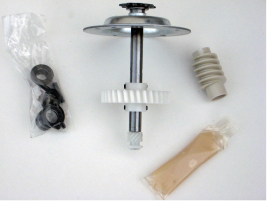
How to replace a chain-drive garage door opener gear and sprocket assembly
Learn how to replace the gear and sprocket assembly on your garage door opener if the drive motor runs but the door won'…
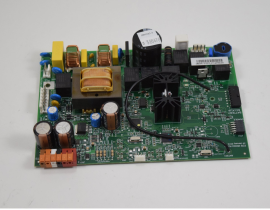
How to replace a garage door opener logic board
The logic board is the brains of the garage door opener. If the remote doesn't work or the door doesn't open and close p…
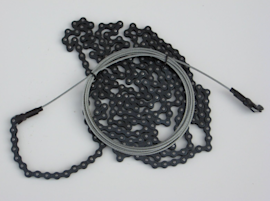
How to replace a garage door opener drive chain and cable assembly
If your garage door won’t move, the chain and cable assembly on your garage door opener could be broken. Follow these st…
Effective articles & videos to help repair your garage door openers
Use the advice and tips in these articles and videos to get the most out of your garage door opener.
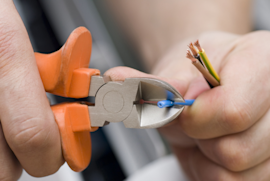
Learn how to repair broken, frayed or damaged wires in your appliances.…
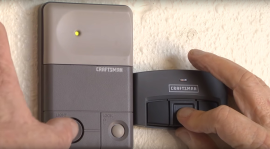
If your remotes don't work, you might need to disable the lock feature, eliminate RF interference or check the batteries…
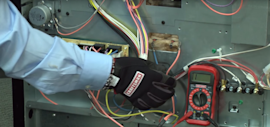
Learn how to use a multimeter to check for wiring problems in an appliance that's not working…
